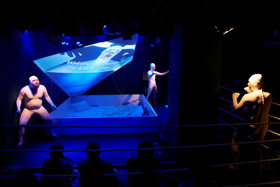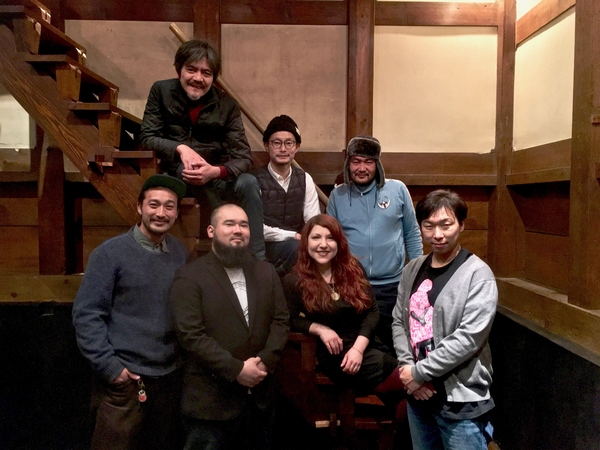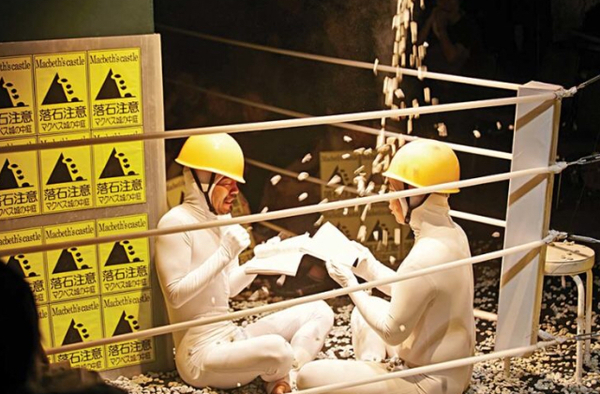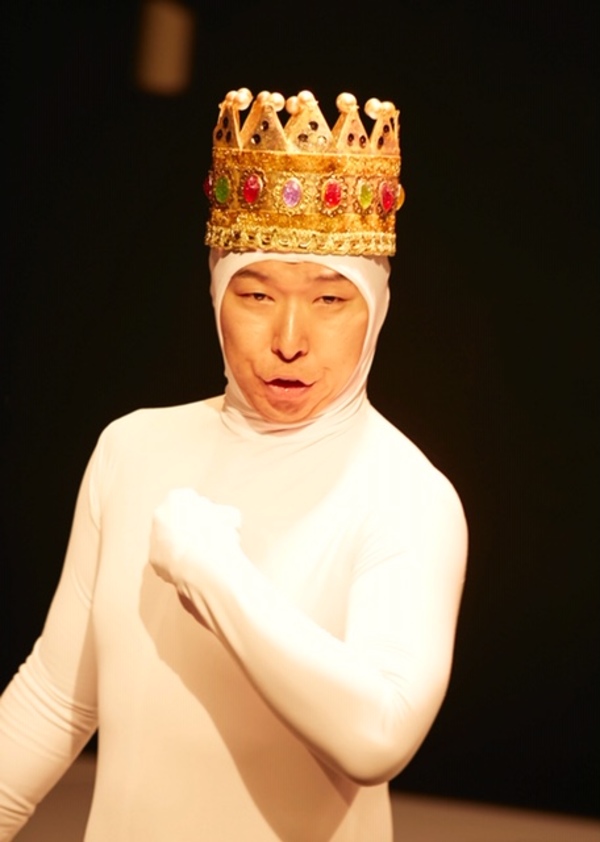BWW Preview/Interview: Manga and Macbeth Merge in KPR's ASHITA NO MA-JOE at Japan Society May 15-18

While even savvy New York theatregoers aren't able to keep up with everything in the city that never sleeps, hopefully after five opportunities to enter the ring with the wildly innovative and imaginative Japanese Theatre Company Kaimaku Pennant Race (KPR) from May 15-18th at Japan Society, they will become -- in Shakespeare's own words -- "a household name" with Ashita no Ma-Joe: Rocky Macbeth. That's certainly the goal and desire of the plucky company led by clever and quirky writer/director Yu Murai, who returns to New York City ten years after KPR performed another twisted version of one of the Bard's masterpieces, Romeo and Toilet, at the New York International Fringe in 2009. A decade ago, their bizarre depiction of the tragic romance garnered them critical acclaim that praised their physicality, passion, powerfully energetic performances and absolute commitment to an almost surrealist absurdity. As all or most Fringe artists, they came on their own dime (or yen) and returned to their country of origin both proud of their achievement and seeking a more reasonable means to return. That opportunity came through Japan Society's equally bold (but slightly less bizarre) artistic director Yoko Shioya, who, like all of the companies she presents, has been watching them for a while now. Shioya is no stranger to taking risks in bringing the most cutting-edge companies from Japan to the U.S. often for their professional debuts and exposing American audiences to some of the most sensational artists in Japan they'd never get to experience otherwise. Fortunately, the 1960s-themed spring 2019 season at Japan Society offered the perfect opportunity to re-introduce New Yorkers to this charming and utterly unique company with a play that fuses a famous '60s manga -- Ashita no Joe (Joe of Tomorrow) -- about a delinquent boxer, with Shakespeare's bloody masterpiece about power lust and prophecy, Macbeth.
The Japanese are no stranger to Shakespeare (the iconic playwright is produced in the archipelago nation second only to his native U.K.), but Macbeth holds a special flame in the hearts of those in the Land of the Rising Sun. Recently, there was the all-female company SYAKE-speare's (a pun that means "salmon-speare") noh version using old Japanese language and disco-glam visuals; Anne Bogart's SITI Company (influenced by the Japanese master director Tadashi Suzuki) with Radio Macbeth; Gekidan Shinkansen's epic "three disc" (i.e. versions with different casts) Metal Macbeth at IHI Stage Around Tokyo that utilized the 360 degree, revolving theatre for the strange saga that took place in both the 1980s and a post-apocalypic future; and perhaps the most renowned, the late legendary director Yukio Ninagawa's exquisite staging that toured for the final bow last summer at Lincoln Center.
All of these are exemplary adaptations, undoubtedly, but KPR's Ashita no Ma-Joe: Rocky Macbeth may be the most inventive and perhaps the most absurd. Much of this has to do with the closeness of the cast and the keen awareness, intelligence and fearlessness of the conceiver. KPR's performances are outrageous and otherworldly yet sincere and grounded simultaneously -- the characters seem both strange and incredibly human in their actions, speech, attitudes and attire (the signature look for just about anything being white hooded bodysuits that render the actors equally neutral and nonsensical). When asked why the fascination with this particular play, Yu Murai offered some insight when I interviewed him and the tight-knit KPR company in Tokyo earlier this year. "It's sort of a cautionary tale about greed and hunger for power," Murai reflected, "In Japan, the good of the group is generally valued over the individual, so this kind of self-serving desire to rise to the top at any cost, including destruction of everything around you and eventually yourself, is both a source of concern and fascination."
Those who attend the immersive experience of Ashita no Ma-Joe will discover a completely transformed Japan Society theatre. The space has been configured into a boxing ring (much like the epic showdown for the Alex Timbers helmed Rocky The Musical on Broadway a few years back, but much more intimate, and a lot weirder) with the audience seated behind the ropes. And, like the ancient Japanese classical arts of kabuki, noh and the more recent butoh style of theatre (all of which KPR draws elements from, while remaining extremely contemporary, avant-garde even) the supernatural elements intermingle with mortals and are presented with the opening and closing of the surface of the ring, much like a Pandora's Box, releasing all of the evils of the world. Even the title bears a pun, for majo, in Japanese, means "witch."
In our interview, Murai pondered a different kind of 'Hero's Journey' -- not that of the obviously righteous and just figure, but a hero in their own mind, one who feels that they are right and will stop at nothing to win, prove a point or gain power and notoriety, much like both the hoodlum boxer from Ashita no Joe and Macbeth himself, or maybe, all of us in ways. "I feel that protagonists from these two origins are both heroes," Murai mused, "I'm pretty certain we had many heroes during the 60s, but I feel like we don't have any at this time." He added, poignantly: "I certainly don't revere anyone as a hero at the moment. So it's natural for us to think, maybe there could be a better version of ourselves, or that each one of us needs to become a hero, and maybe it is possible for us to become heroes."
Getting to see the company up close (really close, so much that I could feel the performer, Takuro Takasaki's breath though they never let that deter or distract them) at Gallery éf, a tiny 150-years-old hardwood store's warehouse turned artspace in Tokyo where they performed a double bill of Son (Musuko), was a transformative experience and made me a KPR and Yu Murai convert and devotee. Two versions of the same three-person story were staged back to back, Harold Chapin's Augustus in Search of a Father where a delinquent, Prodigal Son returns on the run from the law and it's been so long that this own father, a nightwatchman, doesn't recognize him. The actors switched roles and the sinister policeman became the simpleton and oblivious dad, while the actions morphed from kabuki- or butoh-like exaggerations to cinematic naturalism and the language -- while all Japanese of course -- shifted greatly in style. For someone who doesn't understand more than a handful of words, I found the performance captivating and surprisingly understandable. To that, Murai spoke more about the significance of language. "First of all, it's important to honor the Japanese language," he explained, "It also means we have to look at its usage critically and be objective, so we want to go far away from where Japanese is spoken, and perform overseas. The reason being that Japanese language, in a way, is becoming more common throughout the world." He wistfully segued into his hopes for not only KPR, but other theatre companies from Japan to whom English is not their primary (or secondary, or even at all) language. "I look forward to seeing fellow theater troupes from my generation perform overseas also. In short, I would love for us to go abroad more."
KPR company members Takuro Takasaki and G.K. Masayuki weighed in on their return to the States. "Back in 2009, we performed a show in New York City, and ten years later, we are very happy to be going back to do another show," Takasaki chimed in, "If you've seen us before or even if you haven't, I hope many of you will come to see a Macbeth that's born out of modern Tokyo, that is, Yu Murai's take on Macbeth." The fellow with the bushy beard and werewolf-like incisors, G.K. Masayuki, who plays the boxer/Macbeth, hinted, "When exploring the existence of Macbeth and the witches that greet him with a prophecy, we thought it could be likened to what we have in the famous manga called Ashita no Joe where the main protagonist Joe Yabuki and his guiding figure Dampei Tange, a mentor if you will." He continued, "And we thought: a Shakespeare drama and manga could be fused together in ways that only our troupe can make it possible." At that point Murai jumped in to add emphatically, "In Ashita no Joe, Dampei gives Joe some words of advice and in Macbeth, the witches tell him a prophecy. In both works the protagonists' actions are dependent upon the words they hear, so we'd be curious as to what our audience decides to do based on the words they hear in our play. Hopefully, it'll be a great reaction!"
Extending upon our exploration of what it is to be a 'hero' and what that means to an individual personally, Murai offered some additional insights. "I think we're living in an age where there's expectation, obsession and pressure to be a hero. Still, I have no idea how a hero becomes one, but by observing myself and contemplating what could be another version of me, I feel like I could transform myself into something different." Digging deeper, he queries, "So, perhaps I can discover myself if I go far away from Japan. It won't be my search for identity per se, but if we perform our work where nobody knows us, that would certainly be a rare and extraordinary opportunity for us. That's what we'd like to do, and that's the reason for us to go overseas. So we want our New York audience to see us and be moved by us."
When asked some final desires (or dare I say, within the themes here, ambitions) for their imminent return to New York, Murai gleaned, "We'd love for New York audiences to say to themselves 'Oh! They've come all the way from Japan to perform a play here!' We hope our play will affect them such that everyone might discover a different version of themselves. If it leads to that even just a little bit, I'd be so happy!"
While exactly what any audience member might take away from the experience I cannot predict, I can proclaim, with great confidence, that witnessing the return to U.S. shores of one of the most exciting, outlandish, intimate and profound companies performing in Japan (or pretty much anywhere for that matter) is well worth dropping everything to ensure you get a seat in that (Pandora's) boxing ring for Yu Murai and KPR's Ashita no Ma-Joe this week.

Theatre Company Kaimaku Pennant Race (KPR) and director/playwright Yu Murai (Center, hat and glasses) with author Cindy Sibilsky at Gallery ef in Tokyo, Japan.

Theatre Company Kaimaku Pennant Race (KPR) in Ashita no Ma-Joe (c) Takashi Ikemura.

Theatre Company Kaimaku Pennant Race (KPR) in Ashita no Ma-Joe (c) Takashi Ikemura.
Comments
Videos

